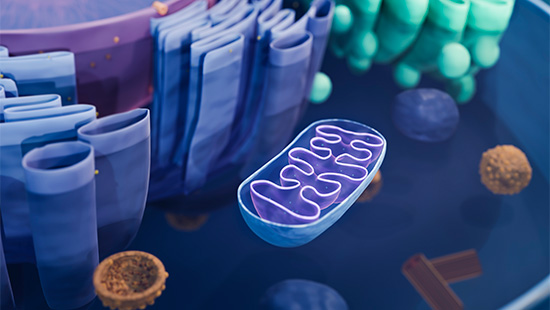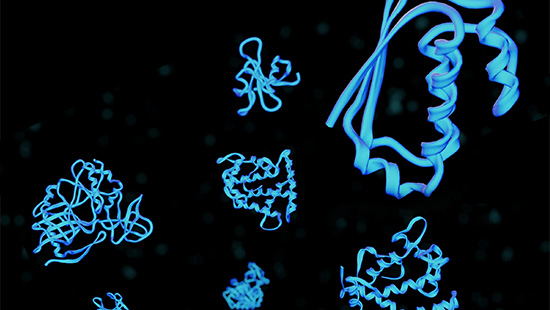Research
Studying populations that exhibit resistance to age-related decline.
Learn more about the efforts of scientists within our institute and how they are studying these populations.
Featured Projects

Cellular Senescence in Swiss Amish
Douglas Vaughan, MD, studies a unique genetic variant in a Swiss Amish community in Adams County, Indiana. Vaughan's work has revealed that people with this variant live more than 10 percent longer and exhibit preserved cardiovascular flexibility, as well as protection from diabetes and lower fasting insulin levels.
Alcohol and Aging
Lifang Hou, MD, PhD, chief of Cancer Epidemiology and Prevention in the Department of Preventive Medicine led the study and discusses the link between genetics and lifestyle in the context of preventing disease.Labs

Nav Chandel Lab
The Chandel Lab’s mission is to discover new biology linked to mitochondria and metabolism that controls physiological responses and diseases including cancer, viral pneumonia, neurological diseases (Parkinson’s, ALS, and Alzheimer) and aging. By unraveling these mechanisms, they contribute to extending longevity and improving healthspan.
Bob Vassar Lab
The Vassar lab's mission is to explore novel biological pathways associated with Alzheimer’s disease. We study the molecular and cellular mechanisms of Alzheimer’s disease with the goal of contributing to the discovery of effective disease-modifying therapies. With this wide-reaching goal, multiple projects focus on diverse aspects of Alzheimer’s disease pathology. Some projects study rare genetic mutations that increase the risk of late-onset Alzheimer’s disease. We also investigate how the microbiome affects astrocyte activation and inflammation in Alzheimer’s disease, and a new project focuses on interrogating the potential of membrane repair as a therapeutic approach for Alzheimer’s. By elucidating these intricate mechanisms, the lab endeavors to advance longevity and enhance cognitive health as we age.


Neil Kelleher Lab
Neil Kelleher’s research group is dedicated to top-down proteomics, chromatin biology, and natural product biosynthesis. Their work, which involves developing and applying mass spectrometry techniques in chemistry and biology, aims to characterize proteins and their modified forms (proteoforms) in human health and disease. By leveraging top-down proteomics, they contribute to understanding chromatin and cancer biology and identifying proteoform markers of disease, potentially leading to interventions that extend longevity.
High-Impact Publications
- Watanabe S, Markov NS, Lu ZY, Aillon RP, Soberanes S, Runyan CE, Ren ZY, Grant RA, Maciel M, Abdala-Valencia H, Politanska Y, Nam K, Sichizya L, Kihshen HG, Joshi N, McQuattie-Pimentel AC, Gruner KA, Jain M, Sznajder JI, Morimoto RI, Reyfman PA, Gottardi CJ, Budinger GRS, Misharin AV. Resetting proteostasis with ISRIB promotes epithelial differentiation to attenuate pulmonary fibrosis. Proceedings of the National Academy of Sciences of the United States of America. 2021;118(20):12.
- McQuattie-Pimentel AC, Ren ZY, Joshi N, Watanabe S, Stoeger T, Chi M, Lu ZY, Sichizya L, Aillon RP, Chen CI, Soberanes S, Chen ZY, Reyfman PA, Walter JM, Anekalla KR, Davis JM, Helmin KA, Runyan CE, Abdala-Valencia H, Nam K, Meliton AY, Winter DR, Morimoto RI, Mutlu GM, Bharat A, Perlman H, Gottardi CJ, Ridge KM, Chandel NS, Sznajder JI, Balch WE, Singer BD, Misharin AV, Budinger GRS. The lung microenvironment shapes a dysfunctional response of alveolar macrophages in aging. Journal of Clinical Investigation. 2021;131(4):21.
- Jenkins LM, Kogan A, Malinab M, Ingo C, Sedaghat S, Bryan NR, Yaffe K, Parrish TB, Nemeth AJ, Lloyd-Jones DM, Launer LJ, Wang L, Sorond F. Blood pressure, executive function, and network connectivity in middle-aged adults at risk of dementia in late life. Proceedings of the National Academy of Sciences of the United States of America. 2021;118(37):7.
- Buss EW, Corbett NJ, Roberts JG, Ybarra N, Musial TF, Simkin D, Molina-Campos E, Oh KJ, Nielsen LL, Ayala GD, Mullen SA, Farooqi AK, D'Souza GX, Hill CL, Bean LA, Rogalsky AE, Russo ML, Curlik DM, Antion MD, Weiss C, Chetkovich DM, Oh MM, Disterhoft JF, Nicholson DA. Cognitive aging is associated with redistribution of synaptic weights in the hippocampus. Proceedings of the National Academy of Sciences of the United States of America. 2021;118(8):10.
- Wolf MS, Serper M, Opsasnick L, O'Conor RM, Curtis L, Benavente JY, Wismer G, Batio S, Eifler M, Zheng P, Russell A, Arvanitis M, Ladner D, Kwasny M, Persell SD, Rowe T, Linder JA, Bailey SC. Awareness, Attitudes, and Actions Related to COVID-19 Among Adults With Chronic Conditions at the Onset of the US Outbreak A Cross-sectional Survey. Annals of Internal Medicine. 2020;173(2):100-+.
- Levine DC, Hong H, Weidemann BJ, Ramsey KM, Affinati AH, Schmidt MS, Cedernaes J, Omura C, Braun R, Lee C, Brenner C, Peek CB, Bass J. NAD(+) Controls Circadian Reprogramming through PER2 Nuclear Translocation to Counter Aging. Molecular Cell. 2020;78(5):835-+.
- Kazi DS, Bellows BK, Baron SJ, Shen CY, Cohen DJ, Spertus JA, Yeh RW, Arnold SV, Sperry BW, Maurer MS, Shah SJ. Cost-Effectiveness of Tafamidis Therapy for Transthyretin Amyloid Cardiomyopathy. Circulation. 2020;141(15):1214-1224.
- Sala AJ, Bott LC, Morimoto RI. Shaping proteostasis at the cellular, tissue, and organismal level. Journal of Cell Biology. 2017;216(5):1231-1241.
- Liu X, Zhang YY, Ni M, Cao H, Signer RAJ, Li D, Li MS, Gu ZM, Hu ZP, Dickerson KE, Weinberg SE, Chandel NS, DeBerardinis RJ, Zhou F, Shao Z, Xu JA. Regulation of mitochondrial biogenesis in erythropoiesis by mTORC1-mediated protein translation. Nature Cell Biology. 2017;19(6):626-+.
- Kundra R, Ciryam P, Morimoto RI, Dobson CM, Vendruscolo M. Protein homeostasis of a metastable subproteome associated with Alzheimer's disease. Proceedings of the National Academy of Sciences of the United States of America. 2017;114(28):E5703-E5711.
- Khan SS, Shah SJ, Klyachko E, Baldridge AS, Eren M, Place AT, Aviv A, Puterman E, Lloyd-Jones DM, Heiman M, Miyata T, Gupta S, Shapiro AD, Vaughan DE. A null mutation in SERPINE1 protects against biological aging in humans. Science Advances. 2017;3(11):8.
- Allen NB, Zhao LH, Liu L, Daviglus M, Liu K, Fries J, Shih YCT, Garside D, Vu TH, Stamler J, Lloyd-Jones DM. Favorable Cardiovascular Health, Compression of Morbidity, and Healthcare Costs Forty-Year Follow-Up of the CHA Study (Chicago Heart Association Detection Project in Industry). Circulation. 2017;135(18):1693-+.
- Shah SJ, Kitzman DW, Borlaug BA, van Heerebeek L, Zile MR, Kass DA, Paulus WJ. Phenotype-Specific Treatment of Heart Failure With Preserved Ejection Fraction A Multiorgan Roadmap. Circulation. 2016;134(1):73-+.
- Schaeffer AJ, Nicolle LE. Urinary Tract Infections in Older Men. New England Journal of Medicine. 2016;374(6):562-571.
- Perak AM, Ning H, de Ferranti SD, Gooding HC, Wilkins JT, Lloyd-Jones DM. Long-Term Risk of Atherosclerotic Cardiovascular Disease in US Adults With the Familial Hypercholesterolemia Phenotype. Circulation. 2016;134(1):9-+.
- Mazzulli JR, Zunke F, Isacson O, Studer L, Krainc D. alpha-Synuclein-induced lysosomal dysfunction occurs through disruptions in protein trafficking in human midbrain synucleinopathy models. Proceedings of the National Academy of Sciences of the United States of America. 2016;113(7):1931-1936.
- Lay K, Kume T, Fuchs E. FOXC1 maintains the hair follicle stem cell niche and governs stem cell quiescence to preserve long-term tissue-regenerating potential. Proceedings of the National Academy of Sciences of the United States of America. 2016;113(11):E1506-E1515.
- Kielb S, Cook A, Wieneke C, Rademaker A, Bigio EH, Mesulam MM, Rogalski E, Weintraub S. Neuropathologic Associations of Learning and Memory in Primary Progressive Aphasia. Jama Neurology. 2016;73(7):846-852.
- Gill TM, Guralnik JM, Pahor M, Church T, Fielding RA, King AC, Marsh AP, Newman AB, Pellegrini CA, Chen SH, Allore HG, Miller ME, Investigators LS. Effect of Structured Physical Activity on Overall Burden and Transitions Between States of Major Mobility Disability in Older Persons Secondary Analysis of a Randomized Trial. Annals of Internal Medicine. 2016;165(12):833-+.
- Freer R, Sormanni P, Vecchi G, Ciryam P, Dobson CM, Vendruscolo M. A protein homeostasis signature in healthy brains recapitulates tissue vulnerability to Alzheimer's disease. Science Advances. 2016;2(8):7.
- Ciryam P, Kundra R, Freer R, Morimoto RI, Dobson CM, Vendruscolo M. A transcriptional signature of Alzheimer's disease is associated with a metastable subproteome at risk for aggregation. Proceedings of the National Academy of Sciences of the United States of America. 2016;113(17):4753-4758.
- Chandel NS, Jasper H, Ho TT, Passegue E. Metabolic regulation of stem cell function in tissue homeostasis and organismal ageing. Nature Cell Biology. 2016;18(8):823-832.
Recent Publications
View a list of recent publications from the Potocsnak Longevity Institute.
recent publications